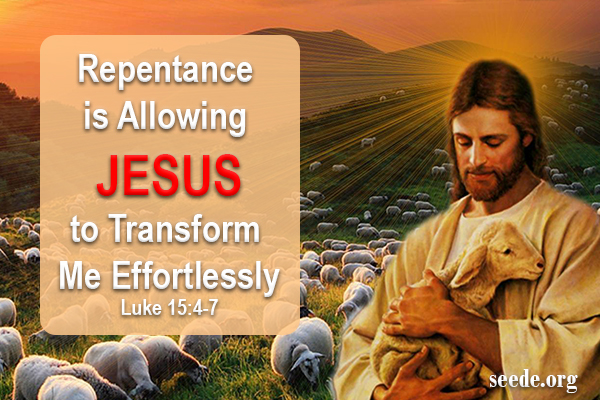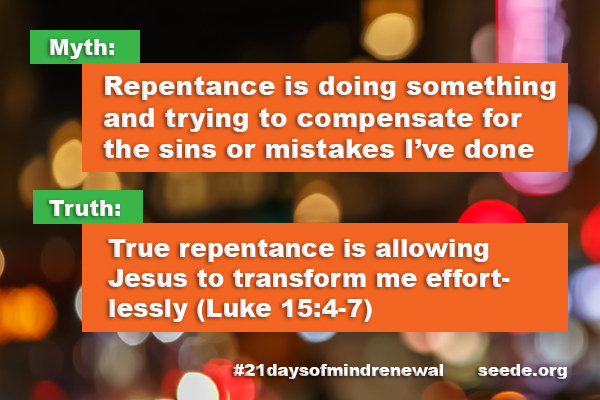Day 10: Repentance is Allowing Jesus to Transform Me Effortlessly


I used to think of repentance as something that I have to outwardly show and earn – to inform the world that I am extremely sorry for all the things that I have done. As people saw me in my grief and sorrow over my sins, the mistakes I’ve done, my ego is stoked, with my inner self gratified knowing that I’ve repented. I then think to myself: God must have been very pleased in what I did, pat on my back, kudos to me!
Repentance was taught to me as something that I would have to do, perform consciously and earn religiously. For instance, after confessing my sins, I would then be told to do something, as a sign that I really regretted doing what I did. Sometimes, the act of repentance would entail serving others – visiting the sick, giving alms to the poor, feeding the hungry – for the purpose of “compensating” for the sin(s) or mistake(s) committed. While it was not directly communicated to me, it was as if, by doing these “works of mercy” to others, that the sins and mistakes that I committed would somehow be “balanced out.” At the end of the day, I would be very pleased if the balance showed I did more good things versus the bad things I committed.
The “balancing” act became extremely tough. I found myself doing a lot of bad things, but not enough good things. So almost daily, the “balance” was always on the downside. What I was doing is never enough, and I can never please God because as I regarded my actions, they were always lacking and constantly not hitting the target of perfection and sinlessness that God expects me to be doing. This process almost made me give up on God altogether as I reckon that following Him is almost impossible to attain if I only depended on myself.
Then one summer, I was introduced to the grace of God and I learned that while repentance involves turning away from sin, the spark for this change comes from Him, led by Him and finished by Him in me. All I needed was to allow God to work in me, with me and through me, and He, in turn will transform me from the inside out, making me a new creation in Him. As my heart is transformed, my actions also changed for the better. The transformation was effortless on my part, because the motive was different this time. Instead of trying to please Him with my so called “works of mercy” and trying to “earn my way” into pleasing Him, the true repentance that He’s offering involved having an intimate relationship with Him. As I align my heart with His, my actions became aligned with His will. The most obvious result of this change: my relationship with others got better and my actions toward others got better. It was an effortless change!
This brings me to this particular point, the parable that Jesus told as recorded in Luke 15: 4-7:
What man of you, having a hundred sheep, if he loses one of them, does not leave the ninety-nine in the wilderness, and go after the one which is lost until he finds it? And when he has found it, he lays it on his shoulders, rejoicing. And when he comes home, he calls together his friends and neighbors, saying to them, ‘Rejoice with me, for I have found my sheep which was lost!’ I say to you that likewise there will be more joy in heaven over one sinner who REPENTS than over ninety-nine just persons who need no repentance.
Jesus used the parallel of a lost sheep with a sinner – that there’s going to be much rejoicing in heaven, similar to when the lost sheep was found by the master, when one sinner repents. But look closely at the parable: What action(s) did the sheep do to warrant such rejoicing? What can a sinner do to warrant such jubilation in heaven?
When the sheep got lost, it was the master who initiated trying to find it. The master left the rest of His flock until He finds the lost one. When the lost sheep was found, the master laid the lost sheep on His shoulders to carry it home. The master rejoiced when the lost sheep was found; He even threw a celebration! And Jesus compared this story of the lost sheep to a sinner who repents.
What then, using this parable, is true repentance? True repentance, according to Jesus, is allowing the Master to do it all for me and you! Despite being side-tracked in the wrong direction and being lost (like the sheep), the Master is always there trying to win us back. Let us, therefore, allow Him to carry us, to lead us back to His fold and His ways, to transform us effortlessly from the inside and out, and to have an intimate relationship with Him. This is what true repentance is, and this is what He desires for us to have!
